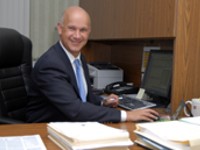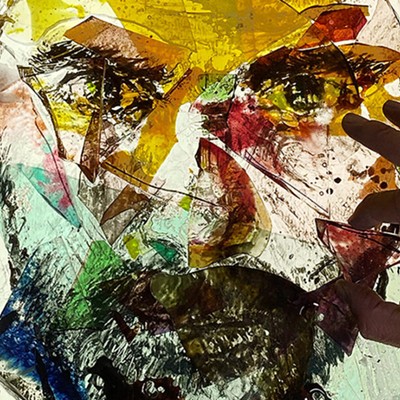[
{
"name": "500x250 Ad",
"insertPoint": "5",
"component": "15667920",
"parentWrapperClass": "",
"requiredCountToDisplay": "1"
}
]
If America is the Invisible University, Rochester is surely one of the institution's biggest colleges. Look hard enough and you can probably find a course in nearly any imaginable subject, night or day. Expand your definition of "informal education," and the learning opportunities in this town are limitless.
To find a course to suit your interest, check the usual venues --- colleges and universities, art and music schools, Writers & Books, BOCES (Board of Cooperative Educational Services), town rec and community centers, museums, and even local government departments. Then go further and look into the smaller institutions like libraries, historical and scientific societies, cultural centers, and religious organizations. Rochester InfoCourses is a unique smorgasbord of courses held throughout the county. Delve deeper still: Many specialty shops sometimes offer courses; even the two big supermarket chains have cooking classes on occasion.
If your interest isn't sated by the course catalogs in your mailbox, ask a related local business or trade union for inspiration.
Following are a few suggestions to get you started.
Portable landscapes
The ancient Egyptians and Indians potted decorative and medicinal plants for easy transport. The Han-Dynasty Chinese composed miniature landscapes as a sacred art. The Japanese elite brought a refinement and natural character to their arrangements. Now you can carry on 4,000 years of "tray planting" right here in Rochester. Known today by its Japanese name, bonsai is a horticultural art that shapes potted dwarf trees into their most beautiful forms.
Rochester resident William Valavanis, who has practiced the art for 40 years and taught around the world for 30, calls bonsai specimens the "pampered pets" of the plant world. The fulltime bonsai artist and educator offers an intro course this fall, specially designed for those with no previous experience. Beginners will go home with a good basic grasp of the art, and four nice potted dwarf trees. How long do the plants live? "Until you kill 'em," Valavanis says.
Introductory bonsai course with William Valavanis, September 16 to October 12. Classes are held from 7 to 10 p.m. Monday and Wednesday, and 9 a.m. to 12 p.m. Saturday, at The International Bonsai Arboretum, 1070 Martin Road, West Henrietta. Students choose any four classes from the schedule. Fee: $70. Info: 334-2595 or www.internationalbonsai.com.
The Zen of (blind) archery
Sharon Pagel has two graphics on her business card: an empty wheelchair and an archery bow. They read left to right across the card, a sort of life story. Eight years ago, waking up after back surgery, Pagel was blind, the result of inadequate oxygen to her brain during the operation. She'd grown up in a hunting family and had bow-hunted for two years before losing her eyesight. "I sat around and felt sorry for myself for a couple of months," she says, until her husband coaxed her back onto the range. Within eight months, she'd bagged a deer.
An archery teacher before the surgery, Pagel continues to instruct Cub and Boy Scouts every summer, and runs archery programs throughout the region for youth and physically challenged. She also coaches women who want to get into archery for sport or hunting. Her message for beginners: "Forget about hitting the target." What matters is that you shoot.
Bow-woman Sharon Pagel, teacher and speaker. Info: 554-3876.
Sweat it
Carmen Ramos just came back to Rochester from his third sundance with the Lakota in South Dakota. By invitation only, participants spend four days without food or water, dancing around the Tree of Life and chanting together in a sweat lodge. On the last day, they are suspended from the tree, attached by buffalo bones skewered through their chests. The only way down is to rip themselves free.
While Ramos dislikes labels --- "Once you call me a teacher of something, I'll be stuck at that point in my learning," he says --- he hails from a long line of healers in Puerto Rico, dating to pre-Columbian times. Let's just say that he practices and teaches a wide array of healing arts, from Tai Chi Chuan for people with a range of disabilities, to alternative therapies for nursing-home and hospice and prison residents, to drumming circles, to Amazonian plant medicine. He's an alternative medicine specialist at the Jewish Home of Rochester, one of the first nursing homes in the country to employ a holistic healer. Oh yeah, and there's the monthly sweat lodge in Middlesex. Participants spend two hours in a small willow-branch lodge with red-hot stones, built to symbolize the womb of Mother Earth. They pray, chant, and sing, and emerge purified and, perhaps, reborn.
Sweat lodge with Carmen Ramos. Contact the Jewish Home of Rochester, 427-7760 x177.
Calling all angels
As a child growing up near Utica, Fran Carns used to imagine climbing onto God's lap or flying around with angels. "They were safe places," she says, "full of unconditional love." She was always sure she wanted to be a healer, but didn't know she had the power.
After working as a nurse and Red Cross instructor, Carns, now 44, opened Angels at Work, a counseling service that tackles anxiety, depression, and all manner of fear and phobia. For the last 10 years, she's led an ongoing Tuesday-night meditation class, a free-form fusion of discussion, guided visualization, and silence. Carns' goal is to guide participants toward accepting their entire selves and treating themselves well. "I don't teach anything," she says, "because there's no right or wrong way to meditate. I just awaken what people already know."
Angels at Work meditation, 7 to 9:30 p.m. every Tuesday, 4210 Ridge Road West. Fee: $10 suggested donation, but no one will be turned away. Canned goods suitable for food-pantry donation also acceptable. Info: 723-9350.
Chivalry lives
You can touch another life in any number of ways. For Jim Piotter, teaching the medieval skills of jousting and swordsmanship works just fine. "You have to have a little fire in what you do," he says. "I see a lot of people who have forgotten how." The 51-year-old competes in international full-contact jousting tournaments, on horseback and in an 80-plus-pound full suit of armor. "It's not creative knitting," he says. Piotter runs an environmental consulting company to pay his chain-mail and lance bills, and offers private and semi-private lessons in all aspects of his sports --- including horse training and "everything from the saber to the broadsword."
Full-contact, full-armored jousting is not the most popular sport in the world, but is certainly among the most demanding. There are 1,500 competitors worldwide, and 15 in the US. Piotter can probably blame his ancestors for this unusual pursuit: Knights perch on the branches of his family tree, as does a Prussian prince.
Black Hawks Jousting and Sword Dueling Clinics, 7061 Gauss Road, Bloomfield. Info: 657-6581.
Potent plants
Community herbalist and educator Angela Tiberio packs a lot into her family's seven-acre organic herb farm: gardens, an herbal apothecary, and a learning center. Aside from concocting all her own herbal stuff --- edibles, potables, slatherables --- she leads herb walks and classes on the farm. To finish out the year, Tiberio is offering a four-lecture series on various aspects of the herbalist's craft. All lectures are from 6:30 to 8 p.m. September 18: Fall Tonics and Foods to Boost Immunity. October 9: Healthy Herbal Teas to Please. November 6: Don't Worry, Be Happy. December 4: Wintertime Herbal Remedies.
Herbal Lecture Series, Lavender Moon Herb Gardens, 7 Boughton Hill Road, Honeoye Falls. Fee: prepaid by two weeks, $15; all four classes prepaid by two weeks, $55. Info: 624-4220 or www.lavendermoonherbs.com.
Speaking in tongues
What do you do if you want to pop the question to someone from another country? Ex-Marine Mike Hilton decided to do right by his Mexican girlfriend, so he enlisted a teacher at Language Intelligence, Ltd. to help him. The company specializes in language and cross-cultural training for business travelers and others who want to master the ways of another country. "We get more and more calls from parents who want their kids to learn a language at an earlier age, or whose kids' schools don't offer language programs," says Irene White, company president.
White and her staff custom-designed a program for Hilton --- as they do for all their clients, from the Japan-bound businessperson to the group of friends planning a bike trip through France. All instructors are native speakers or fluent speakers who can work with all ages. Hilton's teacher, who lived in Mexico for 10 years, taught him how to properly address his girlfriend's family and how to pop the question. (The answer was sí.) Hilton will continue studying until the 2003 wedding in his fiancée's hometown cathedral, to perfect his vows and learn the wedding Mass in Spanish. "By then," he says, "I'll be fluent."
Language Intelligence, Ltd., Language and Cross Cultural Training, Translation and Interpreting Services, 16 Goodman Street. Enrollment: ongoing and custom-tailored; LI has plans for more traditional language programs later this year. Info: 244-5578.
Older and wired
Rose Masucci used to be afraid of mice. Not the furry kind, but the type bound to a computer. The now 77-year-old was getting flak from her friends in Florida and her relatives around the country, who wanted to stay in touch via e-mail. Two years ago, tired of the nagging, she signed up for a course at SeniorNet Learning Center, a local branch of the international organization, housed at the JCC. Within a month, Masucci had gone from not knowing where the on-off button was to buying her own computer. She's about to enroll in her sixth course, and maintains a healthy e-mail connection with all the afore-mentioned naggers.
The not-for-profit SeniorNet grew out of a 1986 research project funded by the Markle Foundation to determine whether computers and telecommunications could enhance the lives of older adults. The result: a worldwide network of over 220 learning centers, and an online community of discussion groups and courses. The two-year-old Rochester center is staffed exclusively by older volunteers, many of them retired professional techies from big local companies. To join, seniors --- people aged 50 and up --- pay an annual tax-deductible membership fee of $40 to the national organization. They can then enroll in local SeniorNet classes and use open-lab sessions for extra help and practice. Most courses run for eight weeks; the maximum class size is 10.
SeniorNet Learning Center, Jewish Community Center, 1200 Edgewood Avenue. JCC membership not required. Fees: $40 membership; courses range from $5 to $65. Info: Helen Newman, coordinator, 461-2000 x463. National website: www.seniornet.org.
School without bills
Single mom Angela Burns was working in a local daycare center, wondering how she could make enough money to raise her son, when she heard about the Rochester Educational Opportunity Center. She'd always wanted to work in a physician's office, so she enrolled in REOC 's entry-level health-clerk program. As soon as Burns completed the 10-week course in May, she was snapped up by Long Pond Pediatrics. Now she earns enough to start saving for her son's college education and to take her first real vacation.
OK, it's a pretty normal pull-yourself-up story, but there's more: All of REOC's courses, from a variety of medical-support skills to computer training to machining, are completely tuition-free. The center, funded by the state through the SUNY Center for Academic and Workforce Development and supported by SUNY Brockport, also offers free GED and college-prep courses, as well as job-placement services for its graduates, gratis. Students only pay for classroom materials, such as books and uniforms.
Tuition-free learning: Rochester Educational Opportunity Center, 305 Andrews Street. Info and application: 232-2730 and www.rochestereoc.com.
Horse power
Cathy Hallett sees kids with physical disabilities sit up straight and kids with ADD pay close attention as soon as they get on her horses. Hallett is certified in hippotherapy, a treatment that uses contact with a horse's movement to improve neurological function, sensory processing, and physical activity. Her therapeutic riding program serves a wide range of kids and adults, from the ambulatory to people in wheelchairs. "The natural motion and warmth of the horse's body works the rider's muscles more than traditional physical therapy exercises," she says.
Many of Hallett's able-bodied students are teenage girls. With all the negative, critical messages girls get from society, she says, "girls are drawn to horses because of the empowering aspect of riding. It gives you power to know you're on something so big, and that you have to build mutual trust." The majority of girls who start riding before their teens will stick with it, she says, and will have a safe and constructive activity and peer group during their tough adolescent years.
Rocking Horse Equestrian Center, 1319 Penfield Center Road. Info: 872-7417.
In This Guide...
Latest in Continuing Education
More by Cindy Mindell-Wong
-

St. Mark meets Britney Spears
Mar 19, 2003 -
Who will lead them?
Jun 12, 2002 -
Will they come?
May 15, 2002 - More »





